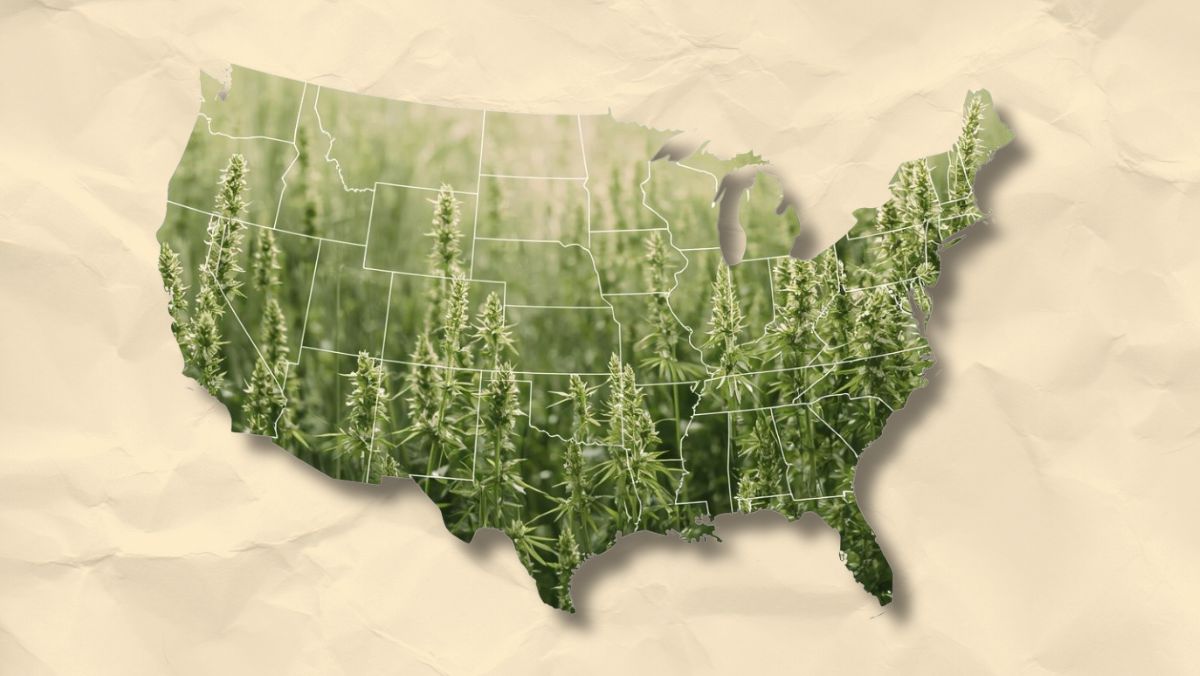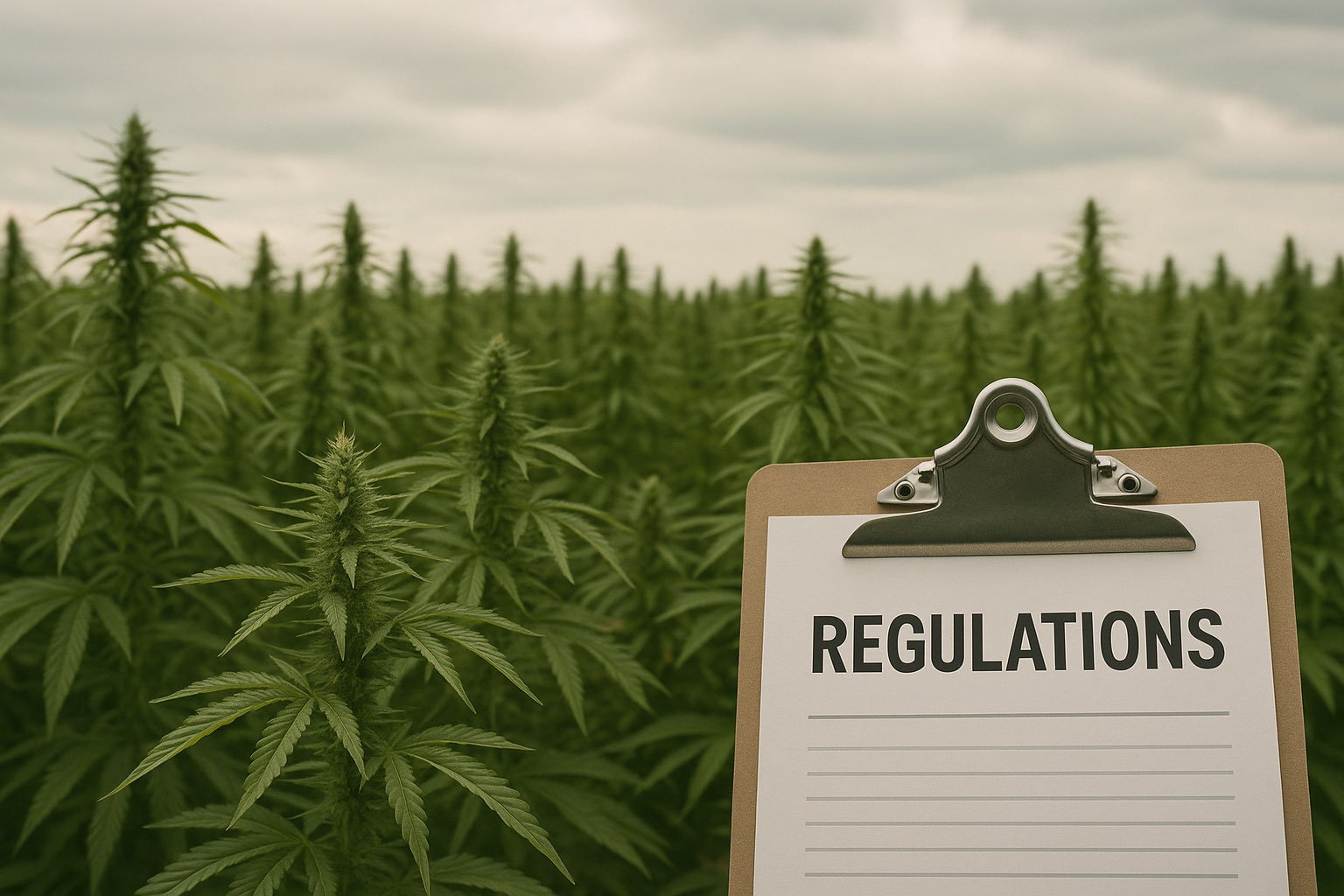ACS Laboratory is one of Georgia’s 10 out-of-state facilities approved to test consumable hemp products in the state. As a registered Georgia testing lab, we help brands meet the revised compliance standards under Senate Bill 494, amending the state's Hemp Farming Act. The law requires strict full-panel testing, clear labeling, and secure packaging every product sold in the state.
Our Georgia-compliant hemp testing delivers fast, accurate results to keep hemp businesses moving and customers safe.
What Georgia's Revised Hemp Farming Act Means for Nationwide Brands
Georgia Senate Bill 494, which went into effect on October 1, 2024, mandates that all consumable hemp products sold in the state must include a valid full-panel lab report called Certificate of Analysis (COA). The report must come from an ISO-accredited and Georgia Department of Agriculture-registered laboratory.
COAs must be less than 12 months old and confirm that the consumable hemp product:
- Contains a legal concentration of total delta-9 THC
- Is free from harmful levels of pesticides, heavy metals, residual solvents, microbial contaminants, and mycotoxins
- Accurately lists cannabinoid content, including THC, CBD, CBDA, CBG, CBGA, CBN, and HHC
What It Took to Become a Georgia Hemp Testing Lab
ACS Laboratory successfully met all of Georgia Department of Agriculture's (GDA) requirements to become a registered Georgia hemp testing lab. This included demonstrating ISO/IEC 17025:2017 Accreditation by A2LA, method validation for all required analytes, and proof that we operate independently from any hemp manufacturer or processor.
With decades of experience, ACS is fully equipped to help brands meet GDA's evolving compliance standards.
What’s Included in a Georgia-Compliant Full Panel Test
Georgia’s full panel hemp test requirements go far beyond basic potency. It covers a wide range of safety checkpoints to verify that consumable hemp products are free from harmful contaminants and correctly labeled. The state requires labs to measure cannabinoids, residual solvents, heavy metals, pesticides, microbial impurities, and mycotoxins—all in the product’s final packaged form.
Cannabinoid Profile (expressed as percent of total weight):
Georgia requires labs to test consumable hemp for at least 12 cannabinoids to verify potency, confirm compliance with THC limits, and ensure accurate product labeling. These results must appear on the COA and be accessible via the product's QR code.
- Total Delta-9 THC concentration (D9): Total THC=Delta9 + THCA *.8777
- Cannabidiol (CBD)
- Cannabidiolic Acid (CBDA)
- Cannabigerol (CBG)
- Cannabigerolic Acid (CBGA)
- Cannabinol (CBN)
- Delta-8-THC (D8)
- Delta-10-THC (D10)
- Delta-9(11) (exo-THC)
- THC-O Acetate (THC-OA)
- Hexahydrocannabinol (HHC)
ACS laboratory offers an expanded Georgia potency panel that includes additional cannabinoids to meet broader client and regulatory needs. Contact us to fully understand what’s required for Georgia and national hemp compliance testing.
Contaminants
Georgia requires extensive contaminant screening to protect consumers from harmful substances introduced during cultivation, extraction, or packaging. Most contaminant limits vary based on product type and route of administration.
Heavy Metals (measured in parts per billion, ppb):
- Arsenic: 200 ppb (inhalable), 500 ppb (sublingual, edible, topical)
- Cadmium: 200 ppb (inhalable), 500 ppb (sublingual, edible, topical)
- Lead: 500 ppb (all categories)
- Mercury: 200 ppb (inhalable), 500 ppb (sublingual, edible, topical)
Residual Solvents (ppb):
- Butane: 800,000
- Ethanol: 5,000,000
- Heptane: 500,000
- Hexane: 100,000
Pesticides (ppb):
Georgia requires testing for 57 different pesticide residues. Each analyte must fall below 100 parts per billion (ppb) or the laboratory’s lowest possible limit of quantitation (LOQ), whichever is lower.
- 1. Abamectin
- 2. Acephate
- 3. Acequinocyl
- 4. Acetamiprid
- 5. Aldicarb
- 6. Azoxystrobin
- 7. Bifenazate
- 8. Bifenthrin
- 9. Boscalid
- 10. Carbaryl
- 11. Carbofuran
- 12. Chlorantraniliprole
- 13. Chlordane
- 14. Chlorpyrifos
- 15. Coumaphos
- 16. Cyfluthrin
- 17. Cypermethrin
- 18. Daminozide
- 19. Diazinon
- 20. Dichlorvos
- 21. Dimethoate
- 22. Dimethomorph
- 23. Ethoprophos
- 24. Etofenprox
- 25. Etoxazole
- 26. Fenoxycarb
- 27. Fenhexamid
- 28. Fipronil
- 29. Flonicamid
- 30. Fludioxonil
- 31. Hexythiazox
- 32. Imazalil
- 33. Imidacloprid
- 34. Kresoxim Methyl
- 35. Malathion
- 36. Metalaxyl
- 37. Methiocarb
- 38. Methomyl
- 39. Mevinphos
- 40. Myclobutanil
- 41. Oxamyl
- 42. Paclobutrazol
- 43. Permethrin
- 44. Phosmet
- 45. Prallethrin
- 46. Propiconazole
- 47. Propoxur
- 48. Pyridaben
- 49. Spinetoram
- 50. Spiromesifen
- 51. Spirotetramat
- 52. Spiroxamine
- 53. Tebuconazole
- 54. Thiacloprid
- 55. Piperonyl butoxide
- 56. Thiamethoxam
- 57. Trifloxystrobin
Microbial Contaminants (cfu/g):
- Total Viable Aerobic Bacteria: 100,000 - yes
- Total Yeast and Mold: 10,000 - yes
- Bile-Tolerant Gram-Negative Bacteria: 1,000 - yes
- STEC (Shiga-toxin producing E. coli): 1.0
- Aspergillus species (fumigatus, flavus, niger, terreus): 1.0 - yes
Mycotoxins (ppb):
- Aflatoxin B1
- Aflatoxin B2
- Aflatoxin G1
- Aflatoxin G2
- Ochratoxin A
(Maximum limit: 20 ppb per analyte)
Visual Inspection for Foreign Material:
Georgia requires labs to visually inspect every consumable hemp product to ensure it is free from unwanted debris. Any visible material not intended to be part of the product, such as filth, hair, insects, plastic, or other contaminants, must be completely absent.
Packaging and COA Compliance Requirements
In addition to passing lab testing, Georgia hemp brands must test label and package consumable products in accordance with Rule 40-32-5-.03 through .06. This includes:
- QR Code Linking to full panel COA: Every Georgia hemp product must include a scannable QR code or a label listing all lab test results
- THC Warning Sticker: Products must display a black and yellow universal THC warning symbol
- Detailed Ingredient List: Including allergen disclosures and sub-ingredients
- Child-Resistant, Tamper-Evident Packaging: Required for all consumable hemp products except single-use vapes
Serving Size and THC Limits:
Georgia (rule 40-32-5-.06) sets strict limits on how much delta-9 THC a consumable hemp product can contain per serving and per package. These limits vary by product type and are designed to prevent accidental overconsumption and ensure consistent dosing.
- Gummies: Max 10mg delta-9 THC per gummy, 300mg per package
- Beverages: Max 10mg delta-9 THC per 12 fl oz container
- Tinctures: Max 2mg delta-9 THC per mL; containers must not exceed 60mL
- Topicals: Max 1,000mg delta-9 THC per package
What Georgia’s Hemp Testing Rules Mean for Brands & Consumers
Georgia’s new consumable hemp requirements seek to protect consumers, prevent misleading claims, and ensure only clean, accurately labeled hemp products make it to shelves. Georgia's standards set a new bar for transparency, and ACS Laboratory is here to help brands meet it.
Whether you manufacture, distribute, or retail hemp products in Georgia, contact us today to ensure your products are top-tier and shelf-ready.
FAQs
Are ACS Laboratory’s COAs compliant with Georgia hemp testing rules?
Yes. ACS Laboratory’s National Hemp Compliance Panel COAs meet or exceed all of Georgia’s requirements under the state's Hemp Farming Act, including Senate Bill 494 and Rule 40-32-5.
ACS Laboratory is registered with the Georgia Department of Agriculture and is ISO/IEC 17025:2017 Accredited by A2LA. For potency, it tests all state-mandated analytes. ACS also goes further with an expanded panel that includes 22 total cannabinoids to meet comprehensive product development needs. Its fully compliant reports includes contaminant screening results and state limits.
What tests are included in Georgia’s full panel safety test?
Georgia’s full panel safety test includes a comprehensive set of analyses. Labs must test for cannabinoid potency, heavy metals, residual solvents, and 57 specific pesticides. They also screen for microbial contaminants such as Shiga toxin-producing E. coli (STEC) and Aspergillus species, as well as mycotoxins. In addition, products must pass a visual inspection to confirm they are free from foreign material.
What does a legal concentration of THC mean for Georgia hemp?
A legal concentration means the product must contain no more than 0.3% total delta-9 THC by dry weight. Labs calculate this by measuring both delta-9 THC and its acidic precursor, THCA, then applying a conversion factor to account for how THCA becomes THC when heated.
Georgia law accepts either decarboxylated measurement or the formula:
Total delta-9 THC = Δ9-THC + (THCA × 0.877).
My brand’s production facility is not in Georgia. Do GDA’s rules apply to me?
Yes. If you sell or distribute consumable hemp products in Georgia, your products must comply with all testing, packaging, and labeling rules, regardless of where they were made.
How much hemp material is required for full panel testing in Georgia?
ACS Laboratory generally recommends submitting 10 -20 grams of product for flower, 17-20 grams for edibles, 17-30 mL for tinctures and liquids to ensure adequate sample volume for all required analyses.
I already tested my hemp through a USDA-compliant lab for pre-harvest purposes. Isn’t that enough to sell in Georgia?
Not anymore. Pre-harvest hemp testing is only step one, and it does not meet Georgia’s strict requirements for selling consumable hemp products.
Georgia’s revised Hemp Farming Act mandates full-panel testing on the final packaged product—not just the raw plant material. That means if you're selling edibles, tinctures, vapes, or beverages in Georgia, you need a new Certificate of Analysis from a Georgia Department of Agriculture-registered and ISO/IEC 17025:2017 Accredited laboratory like ACS.
Are hemp-infused beverages legal to sell in Georgia?
Yes, as of now, Georgia does allow hemp-infused beverages, as long as they meet all current compliance requirements under Senate Bill 494, which governs the state’s Hemp Farming Act.
Georgia Senate Bill 254, which nearly passed in 2025, sought to ban intoxicating hemp-derived beverages entirely. However, that bill did not pass, so hemp beverages remain legal under current law—for now. The close call signals that stricter legislation may still be on the table in the future.









.png)




.png)
.png)
.png)
.png)